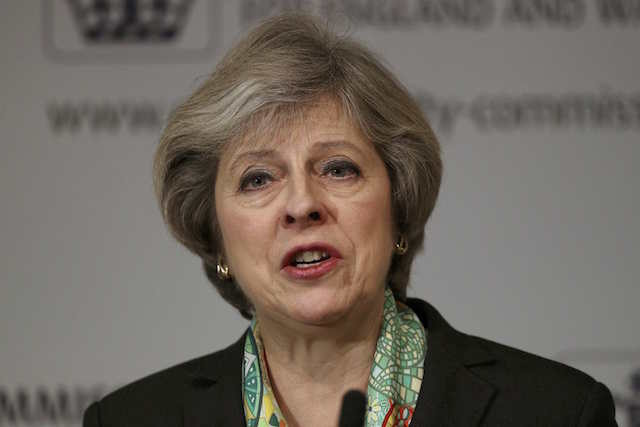Sterling, which has traded at the lowest levels against the U.S. dollar for more than three decades, fell to near three-month lows and stocks were mostly weaker as investors feared May would spell out plans for a “hard Brexit”.
“We seek a new and equal partnership, between an independent, self-governing, global Britain and our friends and allies in the EU,” May will say, according to advance extracts released by her office.
“Not partial membership of the European Union, associate membership of the European Union, or anything that leaves us half-in, half-out. We do not seek to adopt a model already enjoyed by other countries. We do not seek to hold on to bits of membership as we leave.”
Her 12 objectives for upcoming exit talks from the European Union will include ditching preferential access to the single market and quitting the European Court of Justice in return for full control of Britain’s borders, several newspapers reported.
More than six months after Britons voted to leave the EU, May has come under fire from investors, businesses and lawmakers for revealing little about the future relationship she will seek when she begins formal divorce talks by the end of March.
She is due to set out more detail on her plans at 1145 GMT on Tuesday in a speech to an audience including foreign diplomats and Britain’s own Brexit negotiating team.
“NEW FREE BRITAIN”
The extracts from her speech did not set out explicit details of the future trading relationship she wants to have with the EU or what her 12 priorities would be, but British newspapers, most of which backed Brexit, said it would delight those who supported leaving the bloc.
“Theresa’s New Free Britain”, the Daily Mail said on its front page while The Sun, Britain’s biggest-selling tabloid, called it “Great Brexpectations”.
Media reported May would be less explicit on her plans for the customs union, but that her emphasis on building new trade relationships would make clear Britain could be no longer a member of the single market in the way it is now.
The EU would be likely to insist on freedom of movement for EU citizens in return for full access to the single market, while many of those who voted for Brexit did so precisely in order to be able to restrict immigration.
The Times newspaper said May would acknowledge for the first time that transitional deals would be needed to avoid a Brexit ‘cliff edge’ for businesses after Britain leaves the economic bloc that accounts for roughly half of its exports and imports.
May will say she wants Britain to be a “magnet for international talent”, and a “great, global trading nation” that reaches beyond Europe to build relationships with other countries around the world.
She will also say that it is in Britain’s national interest for the EU to succeed.
“We will continue to be reliable partners, willing allies and close friends. We want to buy your goods, sell you ours, trade with you as freely as possible, and work with one another to make sure we are all safer, more secure and more prosperous through continued friendship,” she will say.
(Editing by Catherine Evans)
